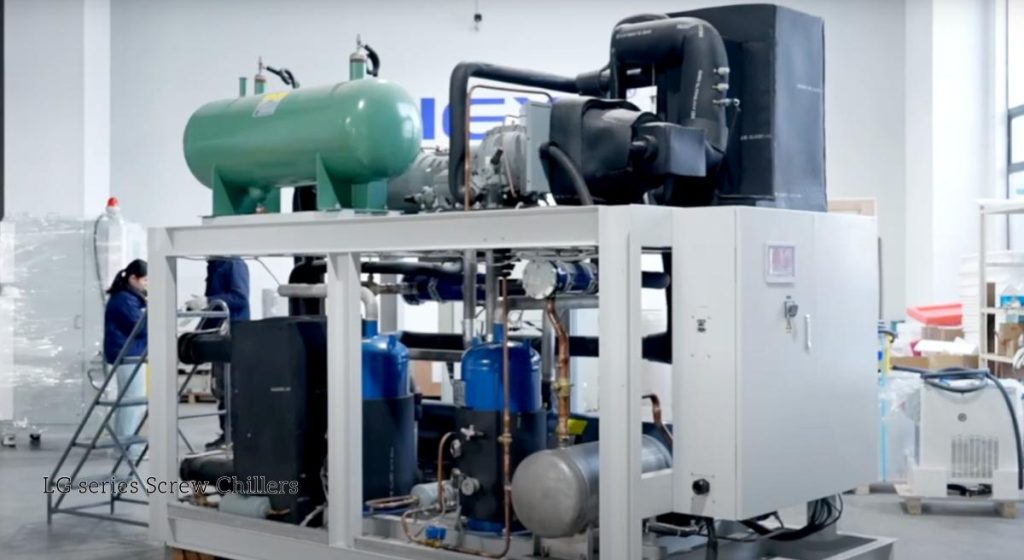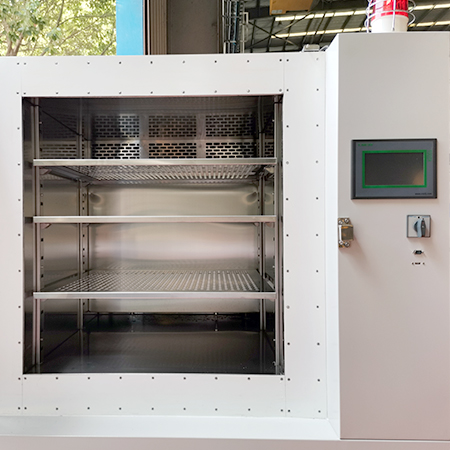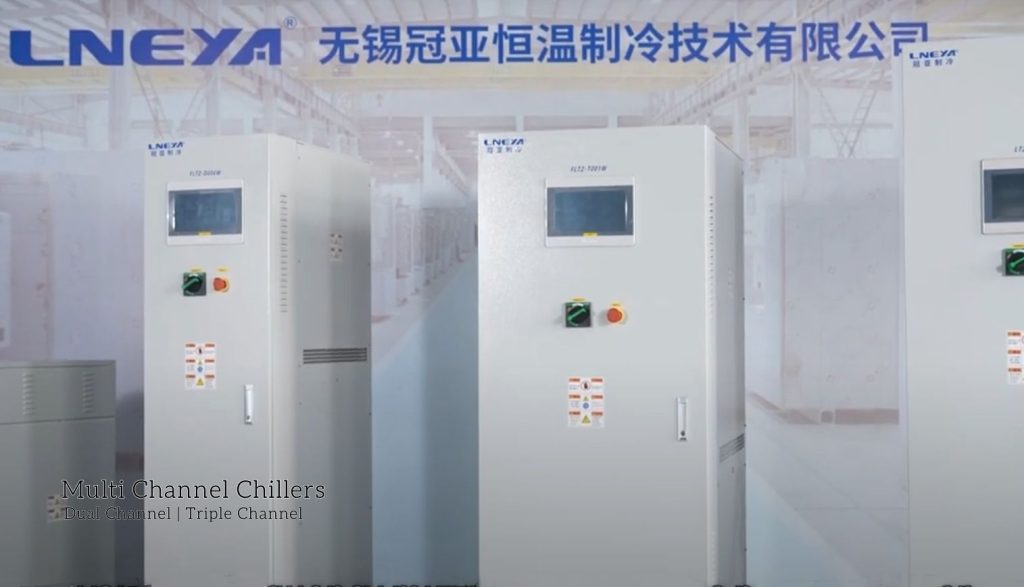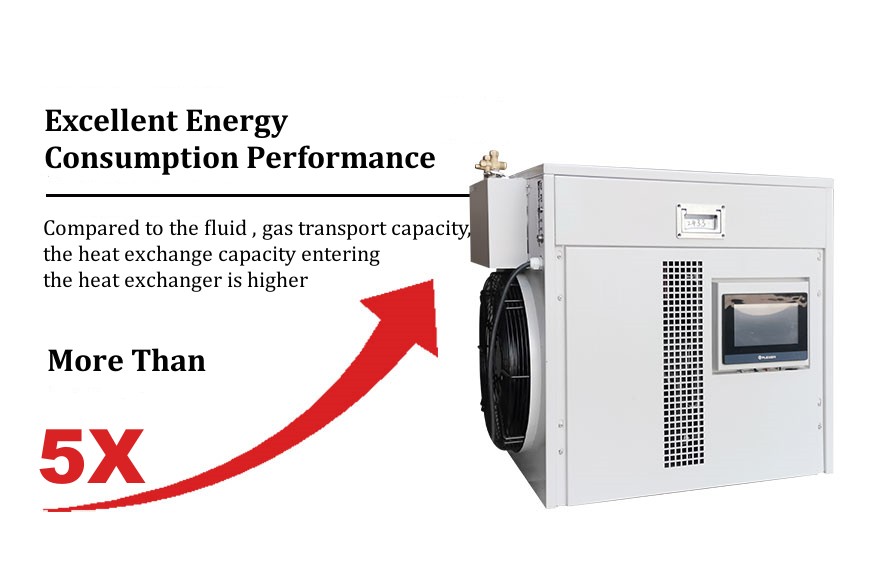Magnetic Drive Pumps in Chillers:Everything You Need to Know
If your industrial chiller still relies on a mechanical seal pump, it may eventually leak refrigerant due to the aging of its sealing components. Therefore, most high-performance chillers now use magnetic drive pumps from internationally renowned brands. So, what are their benefits? What challenges will they face? What is the difference with mechanical seal pumps?
What is a magnetic drive pump?
A magnetic drive pump is a type of centrifugal pump. It does not use a mechanical seal, but uses a high-strength isolation sleeve to isolate the motor and the liquid, and transmits power through magnetic coupling. During operation, the motor transmits power to the external magnet, which generates a magnetic field when it rotates. This magnetic field then uses the magnetic force to drive the internal magnet to rotate, and the internal magnet, in turn, drives the impeller to rotate.
This coordinated movement enables efficient fluid transport. Except for the internal sliding bearing, there is no direct contact between other movable parts, which reduces mechanical friction and wear on bearings. Its most prominent advantage is that it will not leak, which makes it very suitable for pumping hazardous liquids.
Magnetic drive pump and mechanical seal pump
Struktur
• Magnetic drive pump: The main structure of the magnetic drive pump consists of a pump body, a motor, an outer magnetic rotor, an inner magnetic rotor, a isolation sleeve, an impeller and a bearing. The isolation sleeve is between the inner magnetic rotor and the outer magnetic rotor, which can completely separate the liquid and the motor to prevent liquid leakage.
• Mechanical seal pump: The main body of the mechanical seal pump consists of a pump body, a motor, a mechanical seal assembly, an impeller and a bearing. The motor can drive the bearing to drive the impeller to rotate. Its mechanical seal is generally installed at the position where the shaft passes through the pump body.
Sealing method
• Magnetic drive pump: The magnetic drive pump uses a fully sealed structure, and its seal is the isolation sleeve. Because the outer magnetic rotor can drive the inner magnetic rotor through magnetic coupling, there is no need for a connector between the two. The isolation sleeve between the two is stationary, and almost no leakage can be achieved.
• Mechanical seal pump: The sealing of the mechanical seal pump is achieved through the contact between the moving ring and the static ring. The static ring is fixed in the pump body or the sealing chamber. The moving ring rotates with the pump shaft and is tightly attached to the static ring to form a seal. However, if the two are not tightly fitted, or the spring providing axial pressure fails, leakage will occur.
Wartung
• Magnetic drive pump: The seal of the magnetic drive pump is an isolation sleeve, which is very strong and does not need to worry about leakage, so the frequency of checking the seal is very low. Daily maintenance only needs to check whether there is demagnetization, bearing wear or isolation sleeve rupture. Compared with mechanical seal pumps, its maintenance is simpler and the cost is lower.
• Mechanical seal pump: The mechanical seal is a consumable component and must be replaced regularly. However, when replacing the seal, the pump must be disassembled, which is time-consuming.
Kosten
• Magnetic drive pump: The purchase cost of the magnetic drive pump is higher than that of the mechanical seal pump. However, it has a longer service life, requires less maintenance, does not need to replace the seal frequently, and has lower operating and maintenance costs. If used for long-term projects, it is more cost-effective.
• Mechanical seal pump: The price of a mechanical seal pump is lower, but the seal needs to be replaced frequently. Once a leak occurs, it will incur greater repair costs and downtime costs.
Vorteileof magnetic drive pumps
Magnetic drive pumps will not leak due to seal aging or excessive wear, which is its biggest advantage.
There are no direct contact parts of the coupling in the magnetic pump, so the noise generated by vibration during operation is smaller. It is very suitable for use in noise-sensitive places, such as laboratories.
Its pump body design is very compact and can be installed vertically or horizontally. It can be flexibly used in equipment with limited space.
It has almost no leakage. Magnetic pumps with explosion-proof certification can be used in industries such as petrochemicals to help transport hazardous chemicals.
Limitations of magnetic drive pumps
Sensitive to solid particles
The structure inside the pump is precise and the gap is very small. If there are solid particles or crystalline substances in the transported liquid, it may cause the bearing to get stuck or the rotor to scratch. Therefore, filters are generally added to filter the liquid.
Limited applicable temperature range
The magnet material of the magnetic pump is generally neodymium iron boron (NdFeB), and the sliding bearing is carbon graphite or ceramic materials. They have weak temperature resistance and may demagnetize or thermally expand at high temperatures.
No idling
The lubrication and cooling of the bearings of the magnetic drive pump require the help of the pumped liquid. If it is idling, the bearing may overheat rapidly, which may damage the pump or demagnetize the magnetic coupling.
The magnetic coupling has a torque limit
The magnetic pump relies on magnetic force to transmit torque to drive the internal magnetic rotor. The size of the torque is affected by the material and structure of the magnet. If you want to transport a large flow, high head, high specific gravity or high viscosity liquid, it may not provide enough power. It is easy to slip or make the torque transmission fail.
High requirements for the installation position
Most magnetic pumps are non-self-priming. If you don’t want to manually prime the pump before each start, you need to install it below the liquid level or use a priming device. This requires the length of the suction line, the number of elbows and valves.
Schlussfolgerung
Compared with mechanical seal pumps, magnetic drive pumps are more reliable, which is why LNEYA chillers use them. The magnetic drive pumps in our cooling system are all produced by internationally renowned brands and have higher performance.
If you want to buy an industrial chiller, our team can help you configure the specifications and brands of various components according to your application and budget, and provide you with a more cost-effective chiller system.
Verwandte Kühlgeräte
KONTAKT US
TEL:
EMAIL:
WeChat & WhatsApp:

Wechat QR

Haben Sie eine Frage oder benötigen Sie ein Angebot? Füllen Sie das untenstehende Formular aus, und unser Team wird sich innerhalb von 24 Stunden bei Ihnen melden.
 LNEYA Industriekühler Hersteller Lieferant
LNEYA Industriekühler Hersteller Lieferant
















